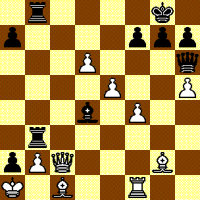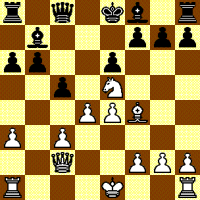Links
written by Amador Cuesta, Spanish journalist also writer for Gambito and New in Chess
It was held a very interesting match, from 21st to 23rd of July, in the Ischia island (Italy), between Vishy Anand and an experimental new version of the very strong chess program Rebel 10.0.
The match was decided at eight games, at different playing levels. During the first day morning would be played four "blitz" games, Fischer clock (5 minutes + 5 seconds per move). That same evening would be played two games at fifteen minutes. And the second and third days of the match would be played the other two, at tournament level ( 40/2 and 1 hour for the rest of the game).
The new version of the program worked on a very fast Acer platform, with the super- microprocessor AMD K6-2 overaccelerated at 450 MHz, the equivalent of an Intel Pentium II at 550 MHz, a real monster, calculating 250.000 positions per second, even more powerful than the tandem Fritz 5.0-Dual Pentium II at 333 MHz, that played in Frankfurt into the Ordix Open (which brillianty won) and also against Vishy, in a mini-match of two 25 minutes games, that the Indian GM won by 1.5-0.5.
The AMD K6-2 was cooled by a revolutionary system based in a thermal bus, at - 40(!!) grades Celsius, made by the American company Kryotech, which serves this system to AMD, Intel, Sun and Digital. The American team called it "Deep Freeze". The system worked here with 64 MB of SDRAM.
The program included a very new playing style, called anti-Grand Master. As the name points out, this new style looks for good positions for the program, open and tactical, trying to avoid closed and positional ones, much more convenient for humans. If it works, it is going to be really shocking.
Other programs will include this feature very soon this year. Surprisingly the program won 3-1 in the first four (blitz) games, and it could have been 4-0 if the program does not make a big mistake (13...Ng3??) in the fourth game, missing the winning line. In the 15 minutes games, Anand lost the first game by time, with a slight advantage, because of a misunderstanding with the playing levels. He then asked for the digital clock used in the blitz games.
The second 15 minutes game was very interesting, with a hard fight, but after 42 moves, it was agreed draw. With this result, Rebel automatically won the match (4.5-1.5). An astonishing result if we have in mind that Anand probably will be the second man in reaching the mythical barrier of 2800 ELO points, and is considered by many as the successor of Gary Kasparov.
 The first tournament game was, by far, the best of the whole match, the program with
black pressing tremendously against the human GM. In the crucial
moment of the game, unfortunately the program missed the winning move
(33...Qe6!) -DIAGRAM, which would have made this game historical.
The first tournament game was, by far, the best of the whole match, the program with
black pressing tremendously against the human GM. In the crucial
moment of the game, unfortunately the program missed the winning move
(33...Qe6!) -DIAGRAM, which would have made this game historical.
Anand played very well, holding the pressure, and seven moves later draw was agreed.
In the last game, Vishy made a fantastic positional sacrifice ( 15...Bd6!), and the program lost after 36 moves.
After the surprising final score (5-3) for the program we will have to wait till a new match, but with tournament games (as initially thought by Ed Schröder, author of the program).
Next year we are going to have extremely powerful programs (Rebel 10.0, HIARCS 7.0, Genius 6.0, Fritz 6.0...etc) and impressive microprocessors (AMD K-6 2 and 3 at 400-500 MHZ, and K-7 at 500-600 MHz, and Intel Xeon at 450-500 MHz, the Katmai at 500 MHz, the Coppermine at 700 Mhz and the Merced at 600 Mhz).
So we can be sure that we will see a hard fight, as those programs will have more than 2650 (!) ELO points at 40/2 on those platforms.
Amador Cuesta
Excerpts from Christian Liebert and Vishy Anand
Christian Liebert
I congratulate Ed Schröder and his REBEL with this fantastic result in the course of which I consider the tournament draw as the real sensation. To (really) get/catch an 2800-Elo-Grandmaster at tournamant time control is hot!
 Vishy Anand (about game-8)
Vishy Anand (about game-8)14.Qd3, this move surprised me.
14..b5
15.Qf3, I did not understand what the program want. After 15..Be7 16.Be3 0-0 17.dxc5 Bxc5 18.Bxc5 Qxc5 19.Nd7 the material gain is worthless as black has a fantastic compensation.
But then suddenly I noticed 15..Be7 16.Bg5 and my eyes became glassy as I realised that 16..Bxg5 17.Qxf7 Kd8 18.Qxg7 would have forced me to resign.
It was a shock for me that such complications suddenly can occur. You think you are playing a quiet positional game but suddenly you are in the middle of all kind of tactics.
Comment from the Rebel team
We like to thank Mr. Anand for this nice compliment. We are used to compliments but this one is certainly one of the best we have got, if not the best! It confirms our views and principals about anti-GM on which we have worked on for so many months.
More excerpts, reviews, opinions and conclusions from the Chess Press are currently under construction.